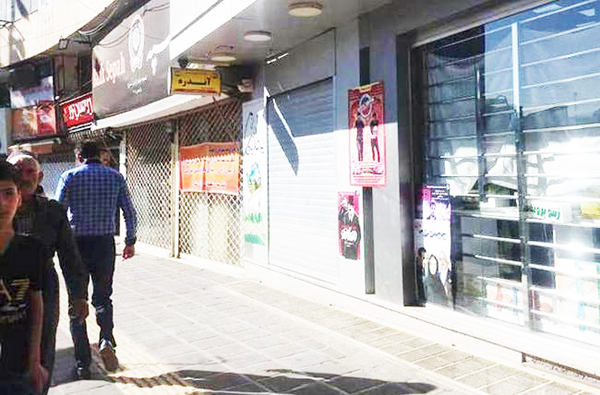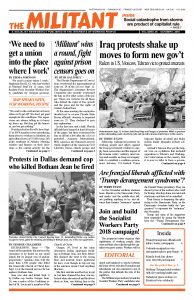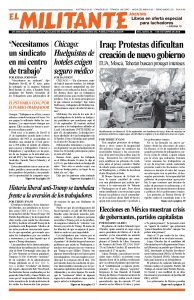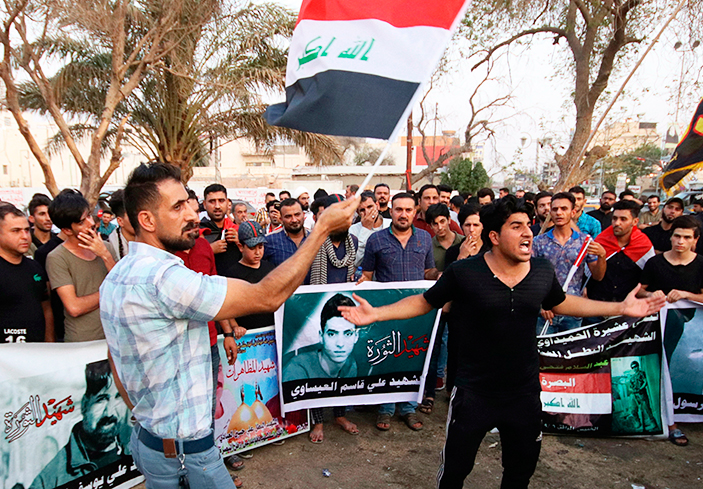Following widespread protests by working people and others against the Iraqi government’s failure to supply basic necessities and the impact of the Iranian rulers’ military intervention and assaults on Iraqi sovereignty, talks to establish a coalition government between U.S.-backed Prime Minister Haider al-Abadi and Shiite militia leader Muqtada al-Sadr collapsed.
Al-Sadr’s Sairoon bloc got the largest vote, on a platform that included opposition to Tehran’s and Washington’s intervention in the country. But it is now in talks to form a government with Shiite militia commander Hadi al-Amiri, who is strongly linked to the Iranian rulers.
No new government has been formed since elections were held in May. Sizable working-class protests in Basra demanded Abadi end a visit there Sept. 10, blaming his administration for the crises they face. Working people have been protesting across southern Iraq for weeks against frequent power cuts during the high heat of summer in this oil-rich region; persistent joblessness; the government’s failure over months to provide safe drinking water, resulting in tens of thousands getting sick; and the impact of the Iranian rulers’ military and political intrusion.
The recent protests in Basra targeted the Iranian consulate and the headquarters of the Badr Organization — the largest Shiite armed group supported by Tehran, which is also the biggest faction within the Iraqi state security forces. The offices of three different militias, all backed by Iran’s cleric-led regime, were attacked. Protesters carried a banner reading, “No to the militias, your militias under our feet.”
Demonstrators also torched government buildings in the city.
These developments take place as the Middle East is at a turning point. Islamic State has been shattered as a major force in both Iraq and Syria. Washington and Moscow, as well as the capitalist rulers in the region, are jockeying for how best to defend their conflicting national interests in the new situation. The interventions of Moscow and Tehran, along with Lebanese ally Hezbollah, have enabled the tottering Syrian dictatorship of Bashar al-Assad to regain control over much of the country.
For Moscow, this means more permanent military bases there and growing influence in the region. For Tehran, it means a further step in extending its counterrevolutionary reach to the Mediterranean Sea.
In addition to sharpening conflicts between Tehran and Washington, the Iranian capitalist rulers expansion has sparked growing clashes with the rulers in Israel. Tel Aviv’s missiles hit a shipment of arms from Tehran to Hezbollah at the airport in Damascus Sept. 15, the latest of dozens of similar attacks this year.

The Iranian rulers intervention deeper into the Mideast goes back to their efforts to consolidate a counterrevolution they carried out at home in the early 1980s, aimed at crushing the rising self-confidence of working people that followed the revolutionary overthrow of the U.S.-backed shah in 1979. Millions of workers and farmers had taken to the streets, occupied oil fields, formed workers councils and won gains for women and oppressed nationalities.
The Iranian capitalists sought to end this and extend abroad the assaults they carried out on working people at home. They fought to establish a corridor of military power, political influence and economic exploitation across the region.
Attacks on Iranian Kurds
Side by side with their intervention in Syria and Iraq, the Iranian government has stepped up its assaults at home. Over the Sept. 8-9 weekend it launched a bombing raid on Iranian Kurds based just across the border in Iraq and executed six Kurdish political prisoners incarcerated for years in Iran.
Shopkeepers in several cities in Kurdish parts of Iran Sept. 12 organized a strike to oppose both the executions and the airstrikes. The Kurds are a 30 million strong oppressed national minority living in Iraq, Iran, Syria and Turkey. They have been fighting for decades for their national rights.
Events unfolding today in Iraq are built on years of imperialist foreign intervention, including Washington’s bombing and invasion in 2003. The U.S. rulers failed to establish a stable capitalist regime and Iraq increasingly fractured along religious and national lines. This led to an opening for the Kurds in Iraq to organize and win a measure of autonomy. The weak government in Baghdad was incapable of organizing effective resistance to reactionary Islamic State, which overran parts of the country in 2014 as the Iraqi army bolted.
In addition to U.S. air power, Baghdad relied increasingly on peshmerga fighters from the Kurdistan Regional Government and Tehran-organized Shiite militias to combat and defeat Islamic State’s brutal anti-working-class rule. Thousands of Iraqis, including many working people, joined these militias and gave their lives to successfully repel the Islamist sect. But this was achieved at the cost of further undermining Iraqi sovereignty, bolstering the Iranian rulers’ predatory foothold in the country and increasing its widely despised influence over the Iraqi government and state. Tehran-backed militias also built a reputation for carrying out brutal reprisals against Sunni Muslims and independence-minded Kurds.
Iraqi government forces have now put Basra under lockdown, deploying troops with heavily armored vehicles at checkpoints across the city “We’ll suspend protests now to spare blood and we’ll return,” Naqeeb al-Luaibi, an organizer of the demonstrations, told the Associated Press. “We will not give up until our demands are met.”


